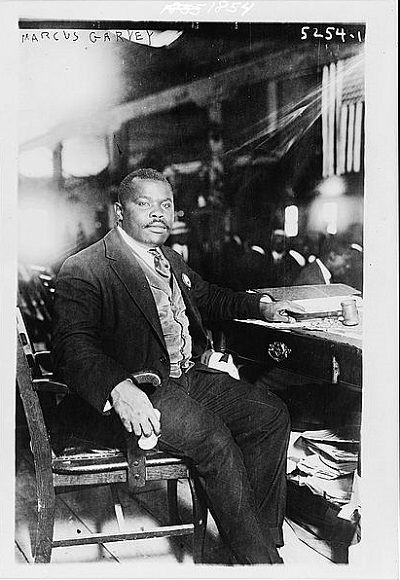The Universal Negro Improvement Association of Canada (UNIA) National Historic Event

© Library of Congress/George Grantham Bain Collection
The Universal Negro Improvement Association was designated a national historic event in 2018.
Historical importance: Black fraternal and political organization founded in Jamaica in 1914 and led by Marcus Garvey.
Commemorative plaque: 2741 Notre-Dame Street West, Montréal, QuebecFootnote 1
The Universal Negro Improvement Association (UNIA), founded by Jamaican-born Marcus Garvey in 1914, was part of a global movement to unite, empower, and improve the lives of people of African descent. From its headquarters in Harlem, New York, the UNIA expanded rapidly across Canada, with approximately 5,000 members in 32 divisions by the early 1920s. The first opened in Montréal, where the UNIA’s Liberty Hall was an important centre for education, economic, social, and cultural activities. The vast majority of Canadian members were West Indian immigrants, who brought a strong pan-African consciousness to the leadership of the UNIA.
The Universal Negro Improvement Association
The Universal Negro Improvement Association (UNIA), founded by Jamaican-born Marcus Garvey in 1914, was part of a global movement to unite, empower, and improve the lives of people of African descent. From its headquarters in Harlem, New York, the UNIA expanded rapidly across Canada, with thousands of members in 32 divisions, from Sydney, Nova Scotia to Victoria, British Columbia, by the early 1920s. The first Canadian division of the UNIA opened in Montréal in June 1919, followed closely by one in Toronto in December of the same year. After Marcus Garvey’s death in 1940, activity and membership went into decline. The Toronto division closed in 1982, but divisions including those in Montréal and Glace Bay, Nova Scotia, continue to offer services today.
For African Canadians, the UNIA established an organizational framework that encouraged them to develop their talents and assume positions of leadership at a time when they were denied these opportunities elsewhere. Liberty Halls, whether owned or rented by the UNIA, were centres for educational, economic, social, and cultural activity when African Canadians had little access to spaces that made community gatherings possible. The vast majority of Canadian members were West Indian immigrants, who brought a strong pan-African consciousness to the leadership of the UNIA.
Historically, the UNIA’s numerous executive positions were filled by men and women who ran weekly meetings, regional conferences and international conventions, raised funds, organized classes, and ran subsidiary social and cultural groups such as the Black Cross Nurses, the School of African Philosophy, and the Literary Club, among many others. The UNIA’s Liberty Halls were the site of the majority of the UNIA’s activities, and the purchase of a hall was a major accomplishment for Canada’s UNIA chapters. They were some of the few places, other than churches, where large gatherings of African Canadians could occur.
The success of the UNIA in Canada is closely associated with the West Indians who made up a majority of its members in Canada and were especially dominant in the major urban centres and in Nova Scotia. In addition to connecting them to a global diaspora of West Indian economic migrants and UNIA members worldwide, the UNIA offered West Indian immigrants an instrument with which to mitigate the systemic racism that affected their ability to find housing and employment and circumscribed their social activity. West Indian leaders of the UNIA modeled lives of engagement and activism for their own communities and for all Canadians.
Backgrounder last update: 2022-08
The National Program of Historical Commemoration relies on the participation of Canadians in the identification of places, events and persons of national historic significance. Any member of the public can nominate a topic for consideration by the Historic Sites and Monuments Board of Canada.
- Date modified :